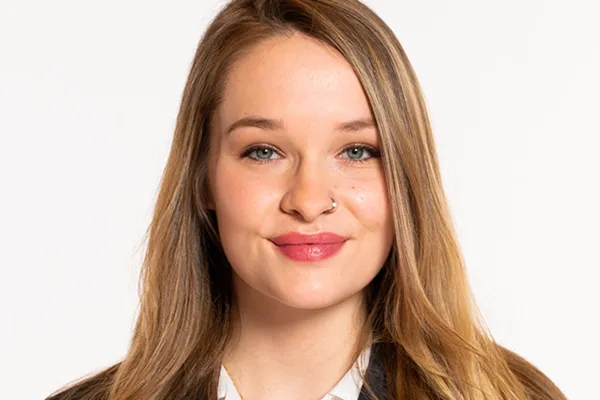Smith’s Scholarship Initiative Helps Ensure a Sustainable Future

Published July 29, 2020
It’s already impossible to fit Madeline Turner ’21’s resume on one page. The anthropology major from Garrettsville, Ohio, has served as president of the Smith Debate Society and principal trumpet in the Smith College Orchestra. And she recently co-authored a book, The Land of Milk and Money: Lessons Learned From Ohio Women in Dairy, inspired by her own childhood growing up on a dairy farm.
But Turner’s true passion lies in using socially responsible entrepreneurship to create sustainable food systems. In fact, Turner was the winner of the Best Green World Ideas Prize in the 2018 Smith College Pitch Competition. Her idea, “Sprout,” utilizes small-animal grazing to manage wildfires. Turner was also a semi-finalist in the 2018 Draper Competition for Undergraduate Women Entrepreneurs for co-developing the concept for Eet, an app that allows consumers to make more ethical consumption decisions by comparing brands and creating a collaborative network of ethics-conscious people.
Turner has been able to accomplish much of this thanks to scholarship aid. “My financial aid means the opportunity to pursue my dreams, and it continuously empowers me to give back to the communities that I came from,” she says.
“My financial aid empowers me to give back to the communities that I came from.”
Here Turner discusses how she’s using her voice to create a more sustainable food system and challenge the power structures that often prevent people from providing nutritious locally-sourced food to their communities.
Why did you choose to come to Smith?
I knew that Smith would help me grow as a person, friend, leader and student. And I wanted to join an empowering and passionate community of people excited to build a better and more sustainable future.
What are you studying?
Within my anthropology major, I look at the intersections of culture, ecology, government and environment. I’m also studying Arabic language and culture. This spring, I’m participating in a language immersion program with the Middlebury C.V. Starr Schools in Rabat, Morocco, and I’m researching the ways shifting economic policies in the Middle East and North Africa impact cultural relationships with food, which is where my concentration in sustainable food fits in particularly well.
How did you become interested in sustainable food systems?
Growing up on a farm allowed me to see that the food system is broken. At the same time, I believe that anyone who wants to have a relationship with the land should be empowered to do so and that my voice as a young gender-minority farmer is crucial in that work. One way I contribute now is as a food educator at Abundance Farm in Northampton, where, among other things, I’ve led a group of teen interns in cooking and serving free community meals each week.
Why do you believe in linking social entrepreneurship to food systems?
Since my family owns a small dairy business, I understand enterprises grounded in food access. I know that by building local food economies we are capable of providing nutritious, culturally appropriate foods to the greatest number of people while challenging the systems of power that currently prevent access to them. At Smith, I’ve put this into practice through my work with the Startup Consulting Group, Smith’s student-run, pro-bono consulting organization. I specialize in advising about the food industry and ethical business practices. I love it because I am able to see how many young people are interested in starting food-based, ethics-conscious businesses that treat both people and the earth with dignity and justice.
Who has had the most impact on your life?
My mother. Beyond instilling in me a work ethic and love of entrepreneurship, my mother taught me how to take on each day as an opportunity to create something beautiful. Best piece of advice your mom ever gave you? For as long as I can remember my mom has repeated the phrase, “Everything counts.” It’s one of her entrepreneurial tenets, but it also reminds me that the things I do have impacts that ripple into the lives of those around me. In the grand scheme of things, everything counts because each of us cares enough to make what we do count. I think that is magic.
How has your financial aid impacted you and your ability to come to Smith?
Without my generous financial aid package, I wouldn’t be able to attend an institution that helps me reach my personal and academic goals and break out of the mold of my small town. My financial aid has changed my life, and I encourage donors to consider making a life-changing contribution to enable another young person to grow in incredible new ways.

By Mary Giles; this article originally appeared in the Spring 2019–20 Smith Alumnae Quarterly.
To make an endowed gift or to learn more about supporting financial aid at Smith, please contact Betsy Carpenter ’93, associate vice president for development, at 413-585-2052 or ewcarpen@smith.edu.